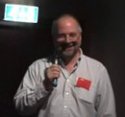Linux dev service offers free videos, “mainstreaming”
Feb 3, 2009 — by Eric Brown — from the LinuxDevices Archive — views Free Electrons has posted 32 free videos from last November's CELF Embedded Linux Conference Europe (ELCE). Additionally, the company says it will work for free to get any drivers or BSPs (board support packages) it is hired to create merged into the mainline Linux kernel.
Free Electrons has posted 32 free videos from last November's CELF Embedded Linux Conference Europe (ELCE). Additionally, the company says it will work for free to get any drivers or BSPs (board support packages) it is hired to create merged into the mainline Linux kernel.
(Click for larger view of Sony's Frank Rowand at ELCE)
Free mainlining
Free Electrons may be best-known to LinuxDevices readers for the free videos it produces at relevant conferences, such as the 32 videos released yesterday from CELF's ELCE conference last November. However, the company also offers embedded Linux system and kernel development. Founder Michael Opdenacker, in a recent blog post, writes “This is essential to be good trainers, in addition to our passion for sharing what we learn.”
In the same blog post, Opdenacker announced a “free mainstreaming” program, under which the company commits to work at no additional cost to get any drivers or BSPs it creates merged into the mainline Linux kernel. The potential benefits of mainstreaming are many, but here's a short list lifted from a presentation that Linux Kernel Maintainer Andrew Morton often gives at embedded trade shows:
- The review, integration, and release process will improve the code quality
- Once merged, your maintenance costs falls to near-zero
- Others will improve it
- Others will no longer break it (as much)
- Others will enhance it
- It gets more testing
- Others will fix bugs in it
- Eliminates possibility that a competing implementation will be merged
- You avoid the risk of having to migrate to a new implementation, or of maintaining yours forever
Of course, many if not most embedded Linux service companies already work to mainstream their BSPs and drivers, in the normal course of their work. Doing so greatly facilitates their ability to maintain the code through multiple kernel releases. As one example, MontaVista is generally among the top 10 contributors of code to Linux.
For customers, a further benefit is that once part of mainline, the code is effectively de-coupled from the company that created it, broadly widening the potential sources of commercial support. In the spirit of open competition, Free Electrons publishes its hourly development rates, Opdenacker notes.
Free videos
Free Electron's latest batch of free videos were shot at last November's CELF's ELCE conference in the Netherlands. Held once yearly in the U.S. and once yearly in Europe, the CELF shows have arguably become the largest annual embedded Linux conferences in existence. (This year's U.S. ELC is set for Apr. 6-8, and registration is open now).
 Harald Welte |
The posted ELCE videos, most of which are accompanied by slides, typically run about 40 to 55 minutes each:
- Opening — Tim Bird and Armijn Hemel
- How chip makers should (not) support free software — Harald Welte, pictured at right (independent)
- Choosing free software graphical libraries for embedded systems — Thomas Petazzoni (Free Electrons)
- Using 'Dot Clock' displays in embedded Linux devices — Vitaly Wool (Embedded Alley Solutions)
- Digital television with Linux — architecture and opportunities — Bas Engel (Philips)
- Managing NAND longevity in a product — Matthew Porter (Embedded Alley)
- A corner-to-corner approach for cost-effective implementation of consumer electronics human machine interfaces — Andrei Smahlei (Synesis Vision)
- A quart into a pint pot: porting uClinux to small micros — Peter Griffin (MPC Data)
- Update on filesystems for flash storage — Michael Opdenacker, pictured below (Free Electrons)
- Rich GUI without pain — Gustavo Sverzut Barbieri (ProFUSION)

Michael Opdenacker - Embedded magic, or how people suddenly find out that they are collaborating — Gregers Petersen (Copenhagen Business School)
- Solar hot water geekery: making infinitely versatile home heating controllers with free software and open hardware — Wookey (Aleph One)
- Taking Linux power management to production quality — Eugeny S. Mints (Embedded Alley)
- Tools and techniques for reducing bootup time — Tim Bird (Sony)
- Avoiding web applications flaws in embedded devices — Jake Edge (LWN.net)
- Adventures in real-time performance tuning, part 1 — Frank Rowand, pictured at top (Sony)
- Adventures in real-time performance tuning, part 2 — Frank Rowand (Sony)
- Using the appropriate wear leveling to extend product lifespan — Bill Roman (Datalight)
- Abusing UPnP — Armijn Hemel (Loohuis Consulting)
- BlueZ 4.0 — Marcel Holtmann (independent)
- Device Trees in Linux — Vitaly Bordug (MontaVista)
- Building bridges — coherence, a DLNA/UPnP framework — Frank Scholz (independent)
- Overview of SquashFS — Philip Lougher (independent)
- Portability and optimization of GNU / open source applications with ARM embedded Linux — Vasileios Laganakos (ARM)
- NAND chip driver optimization and tuning — Vitaly Wool (Embedded Alley)
- Building embedded userlands — Nedjelko Miljevic and Klaas van Gend (Montavista)
- Power management on an ARM11 platform — Mischa Jonker (NXP)
- Linux connection manager — Marcel Holtmann (Intel)
- Suspend modes and power management on Linux — Stefan Seyfried (Suse)
- Coreboot — Peter Stuge (Konsult Stuge)
- Socket aware change of IP address — Samo Pogacnik (Iskratel)
- Embedded maintainers: Community and Embedded Linux — David Woodhouse (Intel)
The videos were taken by Michael Opdenacker and Thomas Petazzoni, both of Free Electrons, as well as Ruud Derwig (NXP), and Tim Bird (Sony). Also available are videos from the co-located Autumn Conference on Mobile Computing, put on annually by NLUUG (formerly known as The Netherlands Local Unix User Group).
In other news, Free Electrons announced last week that it had posted free training materials on Linux embedded development topics. Like its videos, the materials are shared under a Creative Commons license.
Availability
More information and links to the freely downloadable ELCE videos should be here. More details about Free Electrons's mainstreaming commitment can be found here.
This article was originally published on LinuxDevices.com and has been donated to the open source community by QuinStreet Inc. Please visit LinuxToday.com for up-to-date news and articles about Linux and open source.